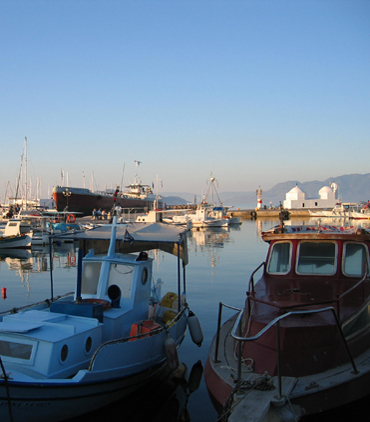

Aegina island located in the Saronic Gulf, just 35
minutes ride on hydrofoil or one-hour on the boat from the port of Pireaus.
An island that, despite all odds, has managed to maintain its unique identity
- still. Nevertheless, in the last 10-15 years over-population, over-construction,
and over-consumption, has stripped the island of some of its most unique
natural, cultural and historic sites.
Aegina is also the site where many known or less-known Greek architects
have left their creative imprint: A. Constantinides, K. Dekavalas,
A. Tombazis, K. Tsipiras, Y. Makris, V. Douras,
T. Fotiou, I. Benesaya, D. Diamantopoulos, and many
others. Aegina is also known for its vernacular architecture, such as the
world-famous Alexandros Rodakis' house in Mesagros, built in 1880,
and Mailis & Brown House in downtown Aegina. Aegina, as the first capital
of modern Greece is also enriched by some unique Kapodistrian civic buildings,
such as the library, the archive and the orphanage (later prison).
Elias moved with his family to Aegina in 2003. He built a house in Plakakia,
which initially was intended to be a summer house, and moved in a year later.
Aegina is a unique place to live and work. It combines the comfort of modern
life - with some limitations, of course - with the authentic community and
untouched wilderness of the past. When visiting the town of Aegina, one
cannot but stop and say 'good morning' to almost eveyone in town. With a
registered (2002) population of 14,000 people in Aegina people still know
each other, people still talk to each other, people still feel the bonding
(and social pressure) of a community. This is a very unique experience today,
as globalization is separating people, distancing them from their surrounding
community.
Elias has intitated in Aegina a number of projects, involving and benefiting
the local community:
(a) Elias was instrumental in starting a household waste
recycling program (campaign started in 2004 and program finally implemented
in May 2007) and in devising a floating
solution for the waste problem of the Saronic islands.
(b) Elias has been instrumental in raising public awareness in environmental
issues through hundred of articles in
Greek in the Saronic Islands free press, and local newspapers.
(c) Elias established the ECOWEEK
events in Aegina in 2005, introducing to the local community concepts of
energy conservation, waste recycling and organic waste composting, and ecological
(or 'green') building. ECOWEEK soon evolved and grew beyond Aegina into
an international
initiative taking place in more than 15 location around the world, involving
students and professionals from the
ECOWEEK Network from more than 40 countries. ECOWEEK also established
the GREENHOUSE,
a platform for young architects and designers, to develop innovative ideas
towards implementation for the benefit of society and the environment.
Left: Sunrise at the port of Aegina